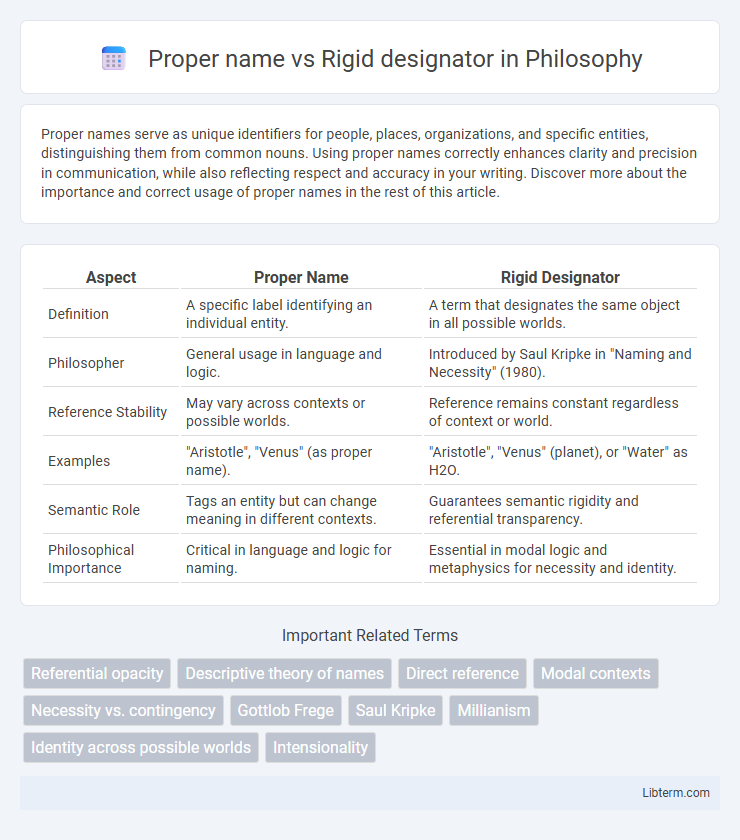Proper names serve as unique identifiers for people, places, organizations, and specific entities, distinguishing them from common nouns. Using proper names correctly enhances clarity and precision in communication, while also reflecting respect and accuracy in your writing. Discover more about the importance and correct usage of proper names in the rest of this article.
Table of Comparison
| Aspect | Proper Name | Rigid Designator |
|---|---|---|
| Definition | A specific label identifying an individual entity. | A term that designates the same object in all possible worlds. |
| Philosopher | General usage in language and logic. | Introduced by Saul Kripke in "Naming and Necessity" (1980). |
| Reference Stability | May vary across contexts or possible worlds. | Reference remains constant regardless of context or world. |
| Examples | "Aristotle", "Venus" (as proper name). | "Aristotle", "Venus" (planet), or "Water" as H2O. |
| Semantic Role | Tags an entity but can change meaning in different contexts. | Guarantees semantic rigidity and referential transparency. |
| Philosophical Importance | Critical in language and logic for naming. | Essential in modal logic and metaphysics for necessity and identity. |
Understanding Proper Names and Rigid Designators
Proper names function as linguistic labels uniquely identifying specific individuals or entities within a given context, providing direct reference without descriptive content. Rigid designators, a concept from modal logic and philosophy of language introduced by Saul Kripke, denote the same entity in all possible worlds where that entity exists, thus preserving identity across different scenarios. Understanding the distinction lies in recognizing that proper names serve as rigid designators by consistently pointing to the same referent regardless of varying circumstances or modal contexts.
Definitions: What Are Proper Names?
Proper names are linguistic expressions that uniquely identify a specific individual or entity within a given context, such as "Aristotle" or "Mount Everest." Unlike descriptions, proper names function as rigid designators, meaning they refer to the same entity across all possible worlds or scenarios. This rigidity ensures that the referent of a proper name remains constant, distinguishing it from non-rigid terms whose reference can vary depending on context.
Rigid Designators: Kripke’s Contribution
Rigid designators, a concept introduced by philosopher Saul Kripke, refer to terms that consistently designate the same entity in every possible world where that entity exists. Unlike proper names, which may vary in reference depending on context, rigid designators maintain a fixed referent, ensuring semantic stability across modal contexts. Kripke's seminal work in "Naming and Necessity" revolutionized the philosophy of language by clarifying how names function in modal logic and metaphysics, emphasizing necessity and identity.
Semantics of Proper Names
Proper names function as rigid designators by consistently referring to the same entity across all possible worlds, underscoring their semantic stability and indispensability in identity statements. In semantics, proper names lack descriptive content, instead contributing directly to the reference, which contrasts with definite descriptions that may vary in extension. This rigidity enables precise communication and disambiguation in natural language, as proper names semantically anchor meaning to particular individuals or objects without reliance on changing attributes.
The Kripke-Putnam Perspective on Reference
The Kripke-Putnam perspective asserts that proper names function as rigid designators, referring to the same entity in every possible world where that entity exists, unlike definite descriptions that may vary in reference. Saul Kripke introduced the causal theory of reference, emphasizing that names are linked to objects through a historical chain of communication, ensuring their rigidity across counterfactual scenarios. Hilary Putnam extended this view to natural kind terms, arguing that scientific terms rigidly refer to the same underlying essence regardless of descriptive attributes, reinforcing the notion of semantic externalism in reference.
Differentiating Proper Names from Descriptions
Proper names function as rigid designators, consistently referring to the same individual across all possible worlds, whereas descriptions often vary in reference depending on context. Proper names have a fixed semantic value that does not depend on the attributes or properties typically associated with the referent. This distinction highlights the semantic stability of proper names contrasted with the contingent and descriptive nature of definite descriptions.
Direct Reference Theory Explained
Proper names function as rigid designators in Direct Reference Theory by consistently referring to the same individual across all possible worlds. This theory asserts that the meaning of a proper name is its direct reference, without the need for descriptive content or sense. Unlike definite descriptions, proper names maintain their referential stability, which is crucial for semantic clarity in modal contexts.
Identity Across Possible Worlds
A proper name functions as a rigid designator, consistently referring to the same entity across all possible worlds where that entity exists, preserving identity regardless of varying circumstances. In contrast, non-rigid designators may refer to different entities depending on the context or world under consideration. This distinction is crucial in modal logic and metaphysics for analyzing necessity and contingency of identity statements.
Philosophical Implications of Rigid Designation
Rigid designators, as introduced by Saul Kripke, refer to terms that designate the same entity in every possible world where that entity exists, distinguishing them from proper names that may lack this necessity. This concept challenges descriptivist theories of naming by emphasizing the necessity of identity and the a priori nature of some truths in metaphysics. Philosophical implications include a reevaluation of reference, necessity, and the modal logic underlying language, impacting the understanding of meaning and identity across possible worlds.
Debates and Challenges in Naming and Reference
Proper names are often considered rigid designators as introduced by Kripke, referring to the same entity in all possible worlds. Debates arise over whether all proper names function rigidly or if some exhibit descriptivist features, creating challenges in semantics and philosophy of language. These discussions impact theories of reference, identity, and meaning, complicating the understanding of naming in linguistic contexts.
Proper name Infographic

 libterm.com
libterm.com